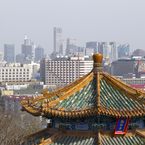Cheng Li
Cheng Li is a senior fellow and director of research at the Brookings Institution's John L. Thornton China Center. Li grew up in Shanghai during the Cultural Revolution. In 1985, he came to the United States, where he received an MA in Asian studies from the University of California, Berkeley, and a PhD in political science from Princeton University. Before joining Brookings in 2006, Professor Li was the William R. Kenan Professor of Government at Hamilton College, where he had taught since 1991.
Li is the author/editor of numerous books, including Rediscovering China: Dynamics and Dilemmas of Reform (1997), China's Leaders: The New Generation (2001), Bridging Minds across the Pacific: The Sino-U.S. Educational Exchange 1978–2003 (2005), China's Changing Political Landscape: Prospects for Democracy (2008), and China's Emerging Middle Class: Beyond Economic Transformation (forthcoming, 2010). He is also the principal editor of the Thornton Center Chinese Thinkers series published by the Brookings Institution Press.
Professor Li has advised a wide range of U.S. government, education, research, business, and nonprofit organizations on work in China. He has frequently appeared on CNN, C-SPAN, BBC, and PBS. Li also serves as a director of the National Committee on U.S.-China Relations, a member of the Academic Advisory Team of the Congressional U.S.-China Working Group, a trustee of the Institute of Current World Affairs, an adviser to the World Bank, and a vice chairman of the Committee of 100.






